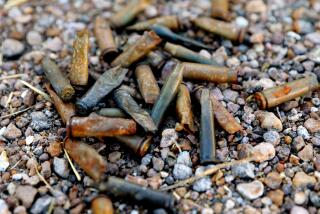‘Sharing the Blame’
- Share via
Bravo for your editorial (Aug. 15), “Sharing the Blame,” regarding the approval by Congress of the $100 million in aid for the contras. It was of immediate interest to me since I have just returned from a two-week visit to Nicaragua, where I collaborated with a group of teachers from San Diego on the renovation and expansion of an elementary school.
I am a bilingual teacher from Salinas, and during my visit to the rural school I observed in classrooms, did some guest teaching, and set up a small library for the school. The second grade teacher, Modesta Ochoa Perez, told me she makes about $22 a month. That’s right, $22--for teaching a class of from 40 to 60 students. Her materials consist of two textbooks per child, chalk, a blackboard, and nothing more. All of the teachers I spoke with hold second jobs, as they are unable to survive on their teachers’ wages.
Nicaragua must spend so much of its annual budget on defense that it has little money left for social concerns. Despite this, there is free health care for anyone who needs it, and basic food needs are assured for all.
Not only is the contra war destroying the lives of those unfortunate enough to live near the Honduran border, but it is also slowly killing the whole country through the drain of financial resources and energy. Young people who should be studying or working must instead serve in the military to defend the villages in the north. Additionally, Nicaragua, like our own South, suffered a severe drought this summer. Many crops failed, and shortages are more severe than ever.
As you pointed out in your editorial, the contras can never win. The Sandinistas have wide political support, and practically every family has, or has had, a soldier in the Sandinista army. On Sundays one can see groups of ordinary civilians practicing military drill, in preparation for the defense of their capital in case of a U.S. invasion.
I lived with a Nicaraguan family during my stay there, and know the Nicaraguans to be warm, open, and very friendly people. They were interested in me, as a North American, and are quite enthusiastic about American culture. I brought back more than 60 letters from Nicaraguan children for my American students, expressing friendship, and a desire to know more about our way of life.
If we, as a nation, offered our hand in friendship to Nicaragua, I am sure they would respond in the same way. One hundred million dollars could do a great deal to help rebuild their tiny country. Doesn’t it make more sense, if we want them to emulate our political system, to offer aid, instead of trying to kill them?
I cannot put into words the deep sadness I feel over this war. I feel a renewed commitment, after personally meeting the Nicaraguan people, to saving their lives.
The majority of American people are in opposition to U.S. involvement in this war. Yet the President, and now Congress, refuses to hear us. What is the next step that we, as Americans, can take toward peace?
GLORIA COFFEY
Pacific Grove
More to Read
Sign up for Essential California
The most important California stories and recommendations in your inbox every morning.
You may occasionally receive promotional content from the Los Angeles Times.












